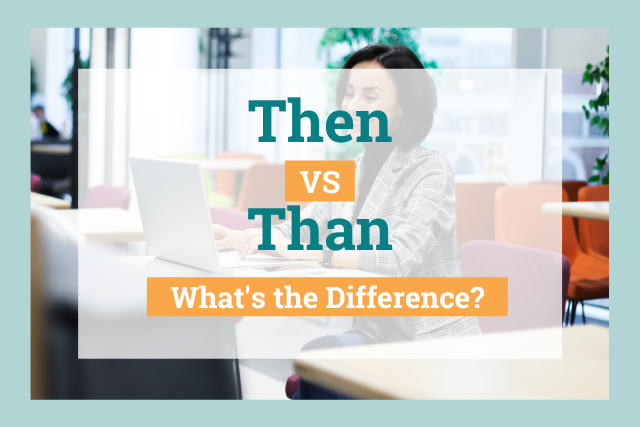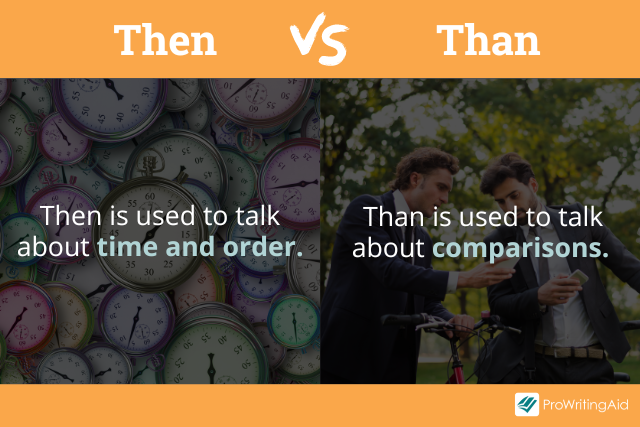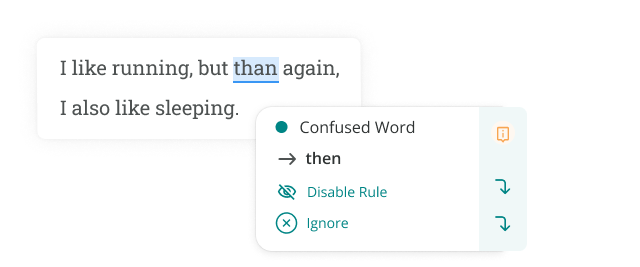
English includes many words that are so similar, they are easy to confuse. Homophones and homonyms make learning English difficult, whether you’re a native speaker or not.
Two of the most confusing words are then vs than, which sound alike but have entirely different meanings.
These two words aren’t rare. They are both one of the 100 most common words in the English language. That means you’re probably using them almost every time you write.
It’s therefore crucial to understand the difference between than and then.
So how do you remember the correct word choice?
Than with an A is used to talk about comparisons, while then with an E is used to talk about time and order.

Let’s take a closer look at the nuanced differences between these two homophones.
What’s the Difference Between Then vs Than?
The essential difference between then vs than is that you should use than when making comparisons, while you should use then for things relating to order or time.
We use than for comparison purposes. For example, you would say, “Kelly is taller than her brother,” not, “Kelly is taller then her brother,” because we are comparing Kelly’s height to her brother’s.
Similarly, you would say “I would rather marry for love than marry for money,” because again, you’re comparing two different possibilities.
In contrast, we use then to talk about time, order, and consequence.
For example, you would say, “Susan went home, and then she went to the store,” not “Susan went home, and than she went to the store,” because we are describing the particular time and order in which Susan performed two actions.
You would also say, “If you don’t study, then you’ll get bad grades,” because you’re using then to describe the consequences of an earlier action.
ProWritingAid can help you ensure you are always writing the correct word. The Grammar Check and Realtime Report will catch most of the occasions that you mix up then and than.

We also have a Homonym report which detects homonyms and homophones.
The report can help you make sure you’re choosing the right word for your writing, rather than another word that sounds similar.
Examples of When to Use Then vs Than in a Sentence
The best way to learn grammar is through plenty of examples.
Take a look at the examples below to get a better idea of when to use than. Notice that all these sentences are making some kind of comparison.
- Do you think you are better than us?
- My grandmother’s china is more than a hundred years old.
- We moved less than a mile up the road.
- She is a better teacher than I am.
- I think it’s more than a passing fancy.
- I’d rather be prepared than be stranded without the essentials.
- Is it better to be loved rather than respected?
- He should know better than to drive without his license.
- The test subjects who took the new medication had less severe symptoms than those who took the placebo.
Now, let’s take a look at the word then in some examples. Notice that then always has something to do with time, order, or consequence in all of these sentences.
- They moved all the furniture to the new house, then took a long nap.
- You don’t like scary movies? Let’s watch a comedy then.
- Then all of a sudden, the lightning flashed.
- She attended Harvard for her Bachelor’s and then Stanford for her Master’s.
- The then President, Barack Obama, signed the executive order.
- Then again, maybe I won’t take the job.
- He hasn’t been the same since then.
- If they are out of Coca-Cola, then get me Pepsi.
- He went to the cinema, then he went bowling, and then he went to Jaime’s house for pizza.
- First they ratified the Constitution and then they ratified the Bill of Rights.
Popular Phrases Using Than
Common phrases that include than are:
- Better than (She’s doing better than she was last year.)
- More than (My son spends more than he earns.)
- Other than (Other than washing the dishes, he doesn’t do much to help around the house.)
Popular Phrases Using Then
Here are some popular phrases that include then:
- Just then (Just then, a knock came on the door.)
- Back then (We didn’t even have electricity back then.)
- Every now and then (Every now and then, she likes to have a glass of wine in the bathtub.)
- Then again (Then again, it could be the worst idea I’ve ever had.)
- Well, then (Well, then, tell her I said hello when you see her.)
- But then (But then, he’d always been a curious person.)
- Till then (Till then, take care of yourself.)
- Then and there (He said it right then and there.)
- Go on, then (Go on, then. Tell them what you told me.)
- And then some (That new car must have cost him an arm and a leg, and then some.)
How to Remember the Difference Between Then vs Than
The easiest way to remember the difference between these two words is to use than whenever you’re talking about some kind of comparison, and then whenever you’re talking about time and order.
Another tip is to remember that the word than often follows comparative adjectives, such as taller, stronger, and bigger.
If you’re wondering which word to use, and you’ve just used a comparative adjective, you should probably be using than instead of then.
Finally, the word then is commonly used as a synonym for subsequently. If you’re not sure which spelling to use, you can try swapping the word for subsequently to see if you should be using then.
Using ProWritingAid is better than editing on your own, because every now and then a grammar error might slip past you!


